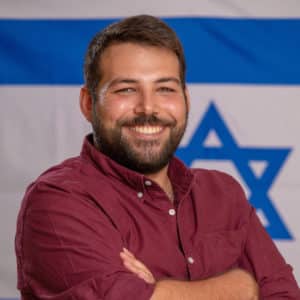-
26 April 2024
A reflection from Dean Bagdadi, Federation Shaliach (Israeli emissary) to Pozez JCC of Northern VA
 Until now, I’ve never worn a Jewish symbol in public. I don’t wear a Kippah; I don’t have a necklace with my name in Hebrew; not even a Star of David jewelry. I never felt like I needed it. Or more broadly, I never felt the need the express my Jewish identity physically. Before I came to Greater Washington, I thought a lot about what to wear. What should I do that can send a clear message about all the different identities I’m holding: Mizrachi, Ashkenazi, Israeli, my love for books and mythologies, my taste in music, my heritage. I am always thinking about what first impression people will have of me. None of those involved Jewishness.
Until now, I’ve never worn a Jewish symbol in public. I don’t wear a Kippah; I don’t have a necklace with my name in Hebrew; not even a Star of David jewelry. I never felt like I needed it. Or more broadly, I never felt the need the express my Jewish identity physically. Before I came to Greater Washington, I thought a lot about what to wear. What should I do that can send a clear message about all the different identities I’m holding: Mizrachi, Ashkenazi, Israeli, my love for books and mythologies, my taste in music, my heritage. I am always thinking about what first impression people will have of me. None of those involved Jewishness.
In Israel, Jewishness is in all public spaces. I believed that if you do put on a Jewish symbol, it reflects your level of faith. How strong are your beliefs. And I am not a religious person; quite the opposite. And like me, so are many other Israelis. We feel like Judaism is for religious people, and we have other worlds. But since I joined the shlichut (a program of Israeli emissaries with The Jewish Federation of Greater Washington), I started a journey — one that was changing the way I view Judaism and the place Judaism holds in me.
And then October 7th happened. And then antisemitism rose. At first, I felt attacked. My Israeli identity was being attacked; my Jewish identity was attacked. I heard suggestions not to show any Jewish signs, not to provoke, not to stand out. I didn’t follow. I saw many others showing proudly their Jewish and Israeli identity, each person in their own way. I felt more than just Israeli; I felt Jewish. I wanted to make sure no one was missing that piece. Davka, (out of spite) — just because.
And then a thought came to mind — I felt more complete. Not because I believe there’s a higher power, that’s a different conversation. I felt like I was looking back and seeing 3,000 years of history, each one with a different challenge for the Jewish people.
Gam Ze Ya’avor, (this too shall pass).
From one to another, each one of us is facing our own trauma. And our collective wisdom, of how to act better as a community, to act better as individuals, is making us stronger and more resilient.
Before October 7th, I didn’t believe in phrases like “Am Israel Chai,” (The people of Israel live). Now, it brings me to tears. I didn’t used to wear a Magen David, now I wear it wherever I go. Things are changing, or maybe it’s because I am getting closer to 30 and slowly more introspective. Who knows. It is a question I will think about for a long time to come.
